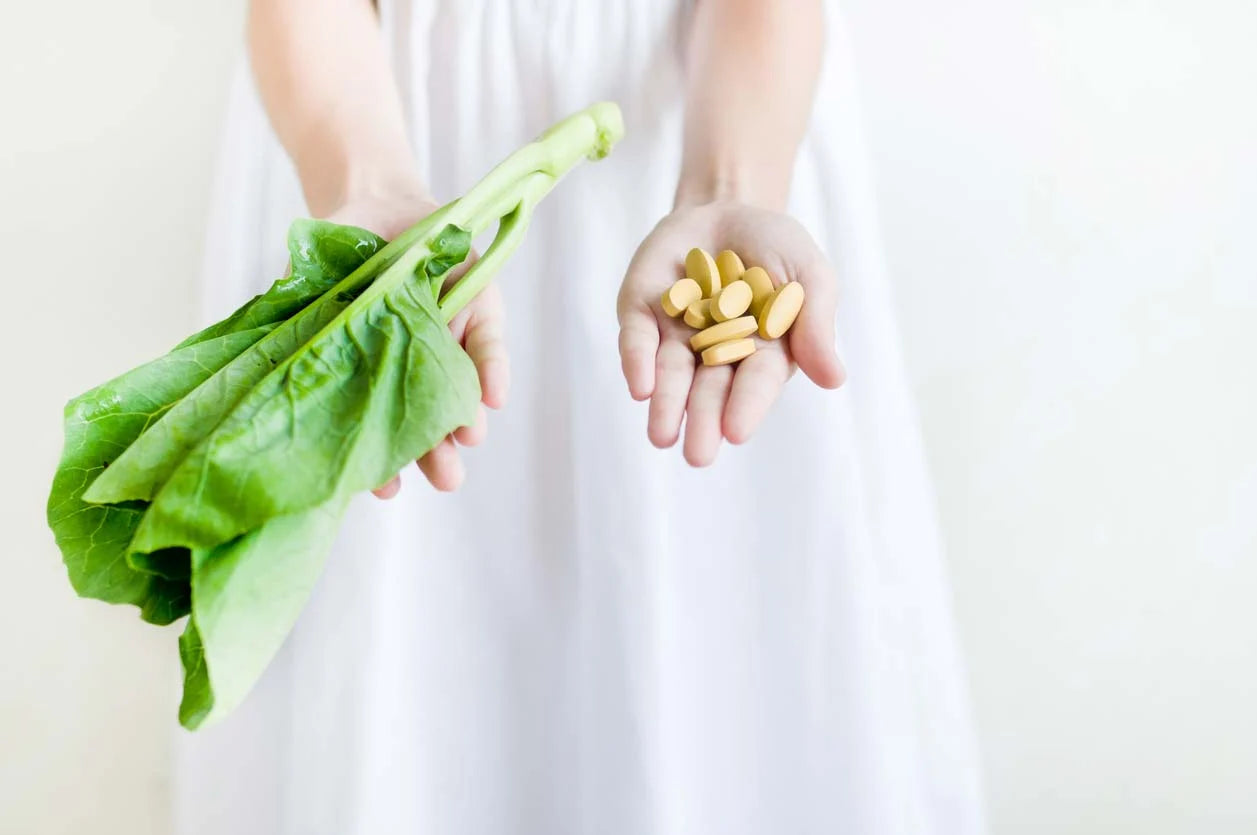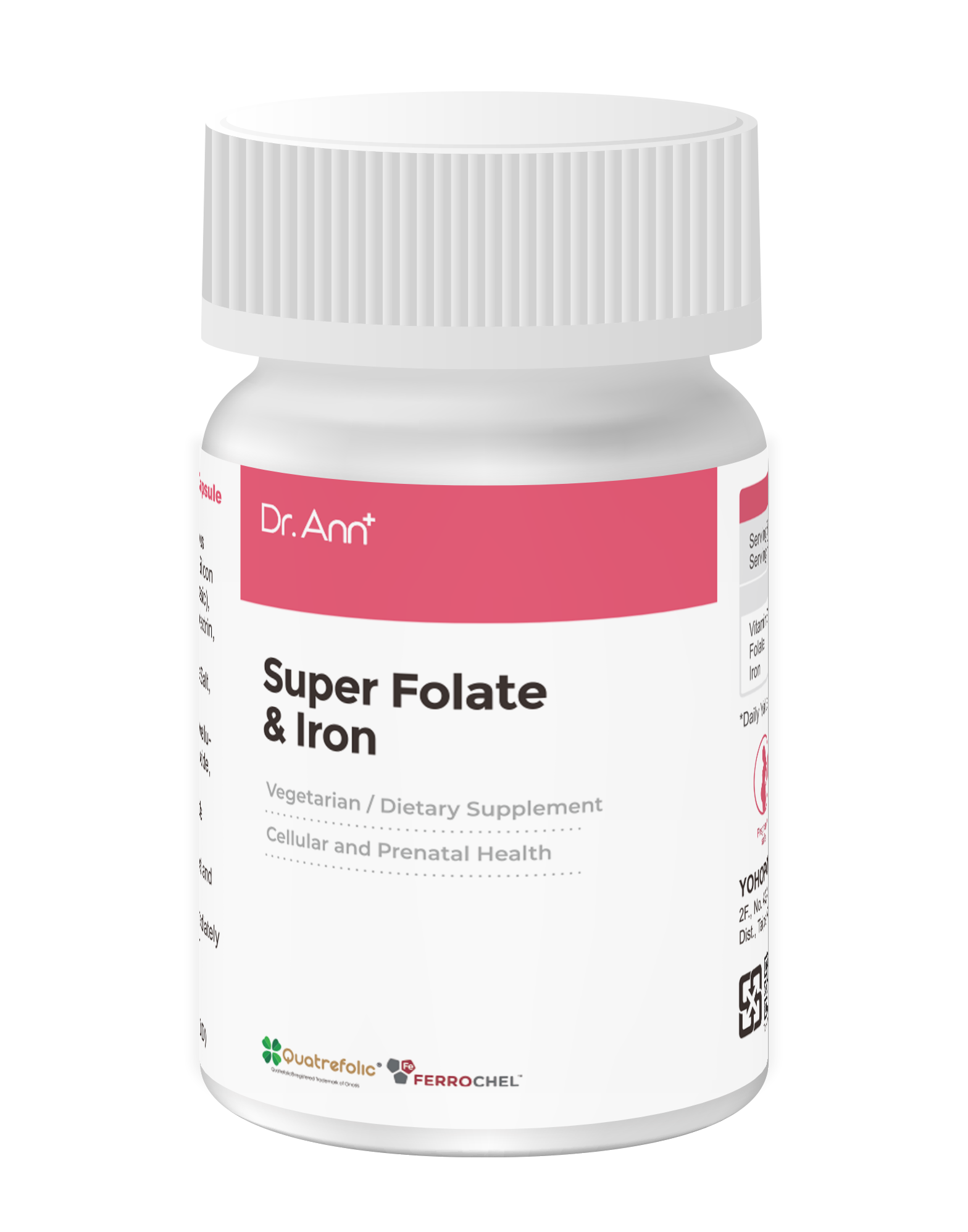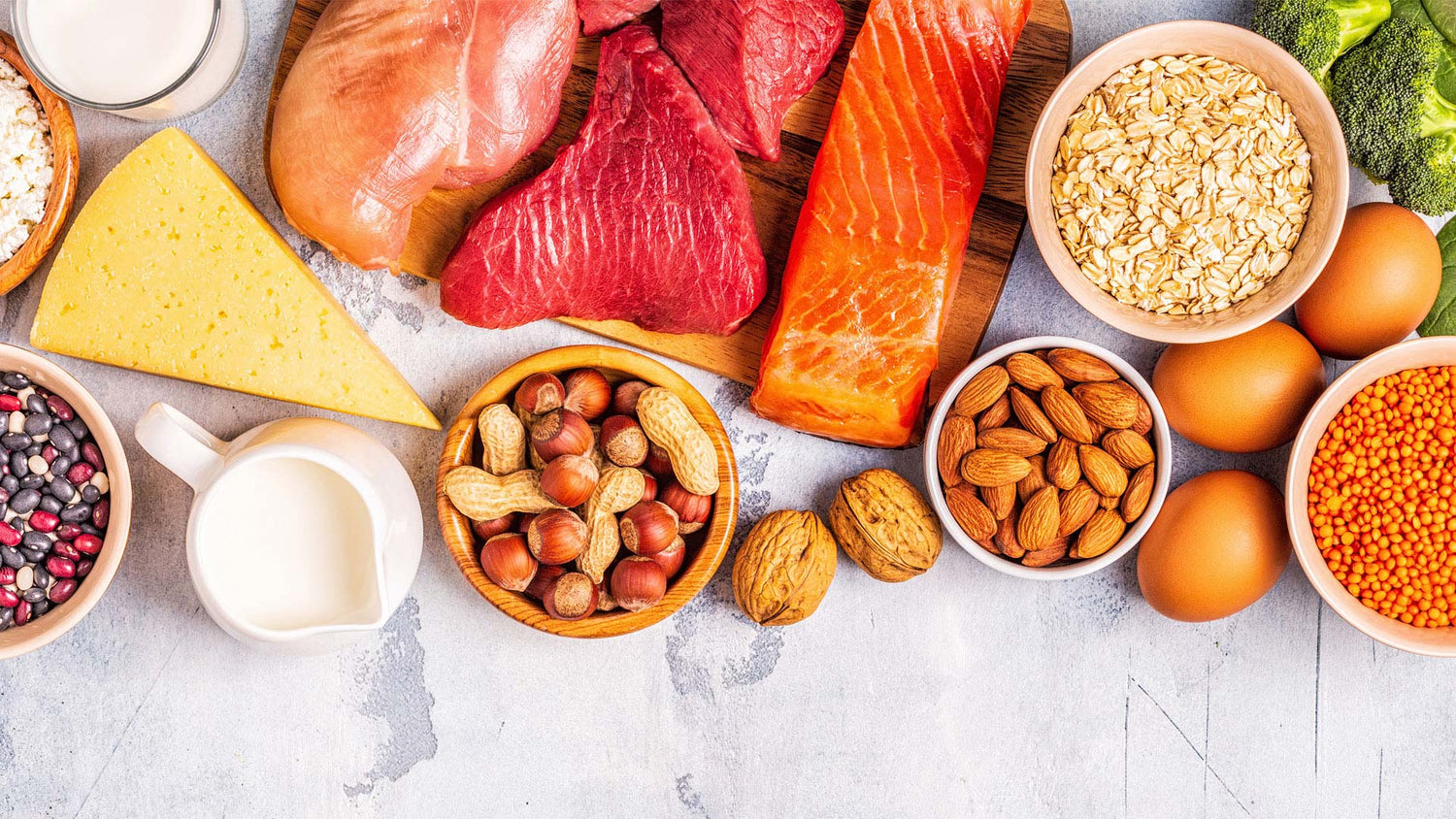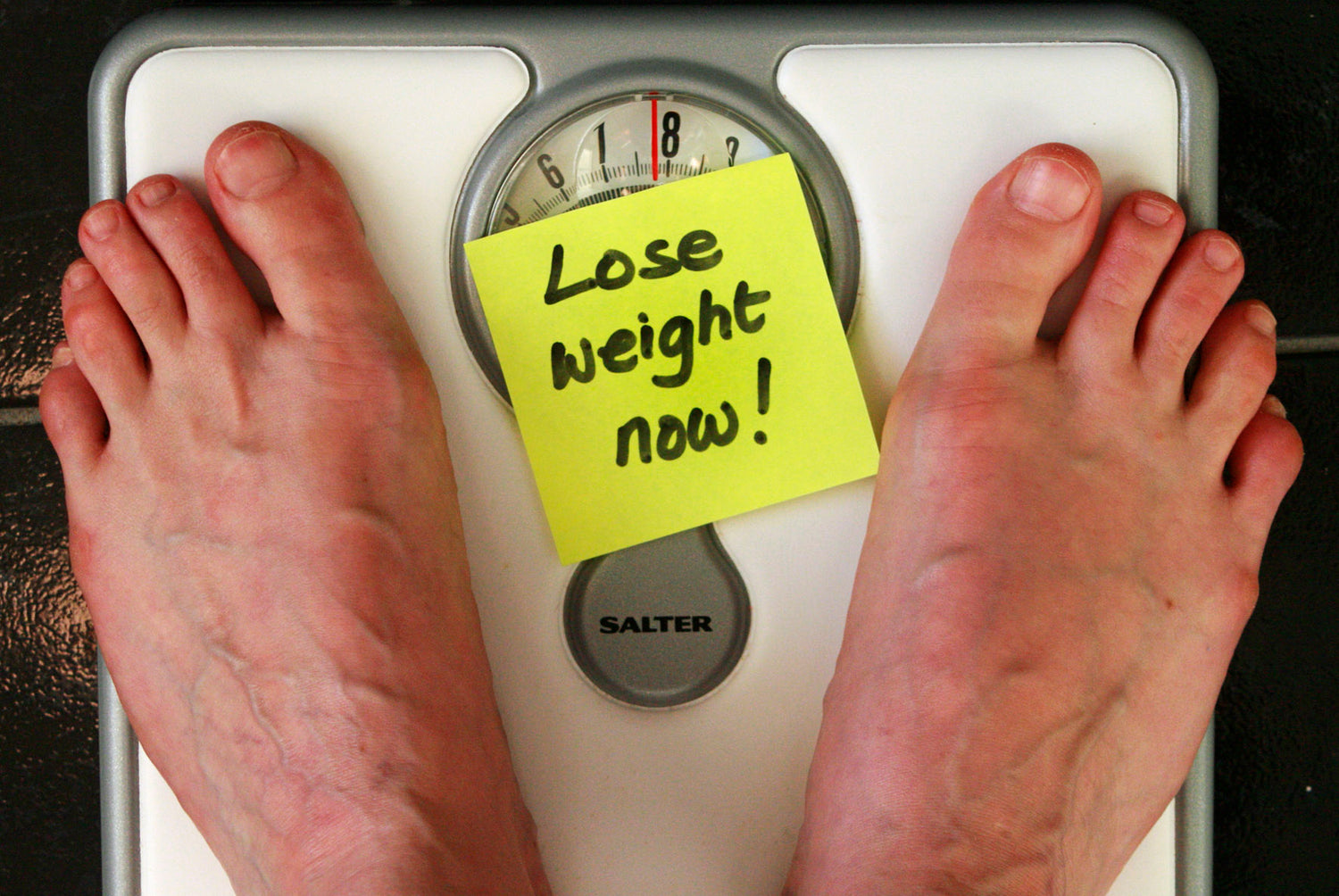As Malaysians focus more on health, understanding folate is crucial. Folate, or vitamin B9, is vital for our well-being. You've probably seen "folic acid and iron" or "ironfolic" supplements in pharmacies. Let's explore folate, its sources, benefits, and the differences between folate vs folic acid.
What is Folate?
Folate is a B vitamin essential for our body's functions. It's named after the Latin word "folium" (leaf), hinting at its abundance in leafy greens. In our body, it's active as tetrahydrofolate (THF).
Malaysian folate-rich foods include:
- Sayur bayam (spinach)
- Sawi (mustard greens)
- Kacang panjang (long beans)
- Taugeh (bean sprouts)
- Pisang (bananas)
- Jeruk limau (citrus fruits)
for more read: Top 15 Folic Acid Foods: Boost Your Health with Foods Rich in Folate
Folate's key roles:
- Creating and repairing DNA
- Making red blood cells
- Processing amino acids
- Fetal neural tube development
Why Folate Matters?
Folate is crucial for:
- Cell growth: Important during pregnancy, infancy, and for skin and blood cell renewal.
- DNA health: Helps prevent mutations that could lead to cancer.
- Red blood cell production: Works with B12 and iron, explaining "folic acid and iron" or "ironfolic" supplements.
- Brain health: Supports nervous system function and may prevent cognitive decline.
for more read: Folic Acid 101: Functions, Benefits, Side Effects, and Dietary Dos and Don'ts
Folate deficiency can cause:
- Anemia: Common in Malaysia, especially among women.
- Birth defects: Increases risk of neural tube defects in babies.
- Heart problems: Can raise the risk of heart disease and stroke.
- Cognitive issues: May increase the risk of memory problems and dementia.
Groups at risk of folate deficiency:
- Pregnant women
- Women who might become pregnant
- People with digestive problems
- Heavy drinkers
- Those on certain medications
Folate vs Folic Acid: Key Differences
While ofted interchangeably, folate and folic acid aren't identical:
Folate:
- Natural form in foods
- Various forms called folates
- Found in whole foods like sayur manis and bayam
- Easily absorbed by the body
Folic Acid:
- Synthetic version
- Used in supplements and fortified foods
- More stable than natural folates
- Needs conversion in the body to become active
Main difference in processing:
- Folate: Easily absorbed and converted in the gut
- Folic acid: Converted in the liver, may lead to unprocessed folic acid in the bloodstream if taken in large amounts
Understanding "folate vs folic acid" helps in choosing between natural sources and supplements like "ironfolic" for optimal vitamin B9 intake.
Health Benefits of Folate
Folate offers numerous benefits:
- Preventing birth defects: Crucial for fetal development, reducing serious birth defects risk by up to 70%.
- Red blood cell production: Works with B12 and iron, explaining the popularity of "folic acid and iron" supplements.
- Heart health: May reduce heart disease and stroke risk by lowering homocysteine levels.
- Potential cancer prevention: May help prevent certain cancers, particularly colorectal cancer.
- Mental health support: Might help manage depression and maintain cognitive function.
Folate-Rich Foods in Malaysian Diet
Our diverse cuisine offers many folate-rich options:
Dark leafy greens:
- Bayam (spinach)
- Kangkung (water spinach)
- Sawi (mustard greens) Tip: Lightly cook to preserve folate. Add to sayur masak lemak or soups.
Legumes and beans:
- Kacang hijau (mung beans)
- Kacang panjang (long beans)
- Tauhu (tofu) Tip: Add to nasi campur or salads.
Folate-rich fruits:
- Pisang (banana)
- Limau (citrus fruits)
- Betik (papaya) Tip: Enjoy as dessert or in smoothies.
Other sources:
- Eggs (telur mata kerbau, telur pindang)
- Nuts and seeds (kacang tanah, biji kuaci)
Fortified foods:
- Some breakfast cereals and breads
for more read: Top Warning Signs of Folate Deficiency Every Malaysian Should Know
Including these in your meals ensures good folate intake. Supplements like "folic acid and iron" or "ironfolic" can complement this when necessary, especially for pregnant women or those with higher needs.
Folate Supplementation: When and How?
While a balanced diet can provide enough folate, supplements may be necessary sometimes:
Who should consider folate supplements?
- Pregnant women and those planning pregnancy
- Women of childbearing age
- People with absorption problems
- Those with increased folate needs (e.g., thalassemia patients)
Understanding "ironfolic" supplements:
"Ironfolic" combines folic acid and iron, popular among Malaysian women. It addresses two common needs: preventing anemia and supporting fetal development.
Potential risks and side effects:
- Possible side effects: Nausea, bloating (rare)
- Risks of excess intake: May mask B12 deficiency or interact with medications
- "Folate vs folic acid" considerations: Some may prefer methyl folate if they have trouble processing folic acid
Always consult a healthcare professional before starting supplements.
Recommended Daily Folate Intake
Guidelines for Malaysians:
Adults: 400 micrograms (mcg) per day
Pregnant women: 600 mcg per day
Children and adolescents:
- 0-12 months: 65-80 mcg/day
- 1-13 years: 150-300 mcg/day
- 14-18 years: 400 mcg/day
Factors affecting needs:
- Health conditions (e.g., malabsorption, thalassemia)
- Lifestyle (alcohol consumption, smoking)
- Diet (vegetarians/vegans may need more attention)
Remember, folic acid is absorbed more efficiently than natural folate, explaining the popularity of "ironfolic" combinations.
Folate Deficiency: Signs and Diagnosis
Common signs:
- Physical symptoms: Constant fatigue, Pale skin, Shortness of breath
- Mental symptoms: Irritability, Trouble concentrating
- Other signs: Smooth, red tongue, Digestive issues
Risk factors:
- Low intake of folate-rich foods
- Overcooking vegetables
- Absorption issues
- Excessive alcohol consumption
- Smoking
- Certain medications
Diagnosis methods:
- Blood tests for folate levels
- Complete blood count
- Homocysteine level test
- Symptom evaluation
If diagnosed, your doctor might recommend "folic acid and iron" or "ironfolic" supplements, especially if you have iron-deficiency anemia too.
Folate for Special Groups
Some Malaysians have unique folate needs:
Pregnant and breastfeeding women:
- Pregnancy: 600 mcg/day
- Breastfeeding: 500 mcg/day
- Often advised to take "folic acid and iron" or "ironfolic" supplements
for more read: 3 Crucial Benefits of Folic Acid for Pregnancy You Can't Ignore
Older adults:
- May need more due to absorption issues or medications
- Folate may help maintain cognitive function
Vegetarians and vegans:
- Can get folate from plants like ulam raja, pegaga, kacang hijau
- May need supplements if diet isn't varied enough
People with certain health conditions:
- Thalassemia patients may need more folate
- Those with absorption disorders may need special supplementation
- People with MTHFR gene mutations might benefit from methyl folate
Athletes and active individuals:
- May need more due to higher energy use and cell turnover
For these groups, the "folate vs folic acid" choice becomes more complex. Consult a healthcare professional for personalized advice.
Potential Interactions and Precautions
Be aware of these when considering "folic acid and iron" or "ironfolic" supplements:
Medication interactions:
- Anticonvulsants, methotrexate, and some ulcer medications can affect folate levels
- Long-term use of stomach acid reducers may affect absorption
Risks of excess folate:
- Can mask B12 deficiency
- High folic acid doses may have unknown effects
- May interfere with some cancer treatments
Health considerations:
- Kidney disease may affect folate metabolism
- Liver disease can impact folate storage
- May interact with thyroid medications
"Folate vs folic acid" considerations:
- Some people may process folic acid differently
- Methyl folate might be better for those with MTHFR gene mutations
Group-specific precautions:
- Pregnant women should follow doctor's advice
- Children need age-appropriate doses
- Check for allergies to supplement ingredients
Always consult a healthcare professional before starting new supplements.
Conclusion: Embracing Folate for Health
Folate is crucial for Malaysians' health. Key points:
Essential for:
- DNA synthesis and repair
- Red blood cell formation
- Fetal development
Health benefits:
- Prevents birth defects
- May reduce heart disease risk
- Possible cognitive health benefits
Rich Malaysian sources:
- Leafy greens (bayam, kangkung)
- Legumes (kacang hijau)
- Fruits (pisang, limau)
Balanced approach:
- Focus on folate-rich foods
- Consider "folic acid and iron" or "ironfolic" supplements when needed
- Understand "folate vs folic acid" for your needs
We're lucky to have many folate-rich foods in our local cuisine. Including these in our diet and understanding our folate needs can significantly improve our health.
Remember, folate is just one part of a healthy lifestyle. Balance your diet, exercise regularly, and maintain healthy habits. Whether you rely on food sources, "folic acid and iron" supplements, or "ironfolic" options, find the right balance for you.
Let's spread awareness about folate's importance. Together, we can work towards a healthier Malaysia with fewer birth defects, lower anemia rates, and better overall health for everyone.
Super Folic Acid + Iron Vegan-Friendly 400mg 60's
- Country of Origin: Taiwan
- Vegan: Yes
- Recommended Age: 12 years and above
- Best Time to Take: Can be taken before or after meals
- How to Use: Swallow capsules with water or open and mix with food
- Dosage: 1 capsule daily, do not exceed 1 capsule per day
References:
1. Folic Acid | National Library of Medicine
2. Folate and Folic Acid in Pregnancy | American Pregnancy Association
3. Folate and Folic Acid on the Nutrition and Supplement Facts Labels | U.S. Food & Drug






